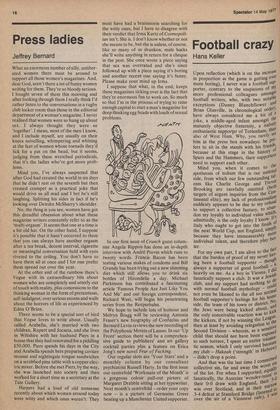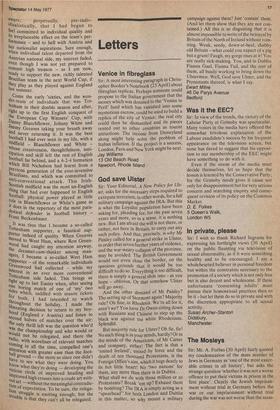Football crazy
Hans Keller
Upon reflection (which is on the increase in proportion as the game is getting ever more boring), I never was a football supporter, contrary to the suspicions of nil' more professional colleagues amongst football writers, who, with two notable exceptions (Danny Blanchflower and Brian Glanville, in chronological order), have always considered me a bit of a joke, a middle-aged infant amongst tlie maturely objective fraternity, a naivelY enthusiastic supporter of Tottenham, tiier! also of West Ham. Why, you rarely se' him in the press box nowadays: he Prefers to sit in the stands with his friends,' because at this stage in the historY Spurs and the Hammers, their supporters need to support each other. Mind you, when it comes to the, apotheosis of tedium that is our national side, from which our few outstanding talents like Charlie George and Trevor Brooking are carefully omitted (1,13th targets of urgent inquiries from the Con" tinental elite), my lack of professionalism, suddenly appears to be due to my refusal to support a collective fantasy, to abaft,don my loyalty to individual value whiell, admittedly, is the only loyalty I knowItaly who ought to get into the finals °, the next World Cup, not England, siMP'Y because they have immeasurably more individual talent, and therefore play bet' ter. For my own part, I am alive to the fact that the burden of proof of my never ing been a football supporter — thou!, always a supporter of good football did fanatically on me. As a boy in Vienna, I 1:14 fanatically support a club. It was a Je",0 club, and my support had nothing to Id with normal football mythology — e°11.1 not even be likened to the all too florin; football supporter's feelings for his bo._Tal side, the team of his town or district. II the Jews were being kicked about, an,, the only conceivable reaction was to kie": the kickers, if not by winning the Leagt then at least by avoiding relegation to t.n; Second Division — wherein, as a sensitid child that should not have been exP°s;,.. to such torture, I spent an entire tranMse tic season, which I only survived becan_ my club — Hakoah ('strength' in Hebrew)
— didn't drop a point. 'tted
And that was the last time I conlini collective sin, far and away the worst sil of the lot. For when I supported, ecely in fanatically, the Austrian wonder-tealn,..„, their 0-0 draw with England, their )0; win over Scotland, and in their narrow 3-4 defeat at Stamford Bridge (listeneVas over the air of a Viennese cafe), I aware, perpetually, pre-i ndiv 'dualistically, that I had begun to feel committed to individual quality and its irreplaceable effect on the team's performance – and to hell with Austria and her nationalist aspirations. Sure enough, When individual talent departed from the Austrian national side, my interest faded, even though I was not yet prepared to commit high treason – as I am now, ready to support the new, richly talented i Brazilian team in the next World Cup, f they play as they played against England last summer.
Come the early 'sixties, and the wonder-team of individuals that was Tottenham in their double season and after, tight up to the first English conquest of the European Cup Winners' Cup, with Danny Blanchflower, Johnny White and IttaanY Greaves taking your breath away and never returning it. It was the best football I had ever seen in my life, with a midfield – Blanchflower and White Whose creativeness, thoughtfulness, anticipation and skill left the rest of English football far behind, and a 4-2-4 formation Which Bill Nicholson had learnt from a Previous generation of the ever-inventive Brazilians, and which was committed to anti-conventional attack. This Iris.hScottish midfield was the most un-English h thing that had ever happened to English football: physical power played as little rOle in Blanchflower or White's game as n does in the repertory of the most para,,d°4jeal defender in football history – rranz Beckenbauer.
It was thus that I became a so-called Tottenham supporter, a fanatical supPorter indeed of quality. When Greaves moved to West Ham, where Ron Greenwood had caught my attention anyway, the dreamer-cum-thinker among managers, I became a so-called West Ham suPPorter – of the remarkable individuals Greenwood had collected – while my _interest in an ever more conventional Tottenham side faded. This bringsus right up to last Easter when, after seeing One boring match of one of `my' two Sides which, saddled with season tickets fdr both, I had intended to watch throughout the holiday, I made the liberating decision to return to my boyhood (England v Austria) and listen to Second halves of matches over the air: the only thrill left was the question who'd win the championship and who would or Would not be relegated, and there the radio, with scorelines of relevant matches coining in all the time, compelled one's ,attention with greater ease than the foot?all ground — the more so since one didn't ,_nave to see what they were doing. You w what they're doing — developing the cious circle of improved heading and unproved high crosses into a crude art with()rut art — without the meaningful contradietii" of expectation. To be sure, the relegaon struggle is exciting enough; but the trouble is that they can't all be relegated.



































 Previous page
Previous page